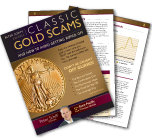One of the most important questions when buying precious metals can also be one of the most confusing: how much should you pay for gold and silver? Precious metals retail pricing is based on the spot price of the metal at the time of the sale plus the premium surcharge, which can vary drastically from dealer to dealer. In the past, we’ve suggested that a fair premium on gold and silver bullion products is no more than 7% over spot.
However, with the recent correction in the prices of gold and silver, our previous 7% premium suggestion has become a little outdated, especially for silver. Physical precious metals demand is breaking records around the world as investors hurry to buy at bargain rates. This demand is straining supplies, and consequently premiums are rising everywhere.
Although the mainstream news is focusing on gold sales worldwide, US premiums for the yellow metal haven’t fluctuated as much as those for silver. A competitive dealer should still offer gold for less than 7% over spot. Silver premiums are another story. Before the price correction, silver premiums had inched up to around 10% on average. After the correction, premiums have soared to as high as 20% over spot for the most popular 1-ounce silver coins!
Does this mean that dealers are suddenly hiking rates just to gouge more money from their customers? Actually, no. Prices are rising everywhere for both wholesale and retail customers. With supplies limited, dealers are paying more for their stock and naturally have to pass some of that cost onto their customers.
A new investor might baulk at a 20% premium and decide it is best to wait for that number to drop back down. While this hesitation is understandable, the investor risks missing out on a great opportunity. Personally, I would rather lock in these low prices than wait and run the risk of the price moving up rapidly. Plus, paying a 20% premium on today’s prices makes sense if you think silver will return to its previous highs.
For instance, do you think silver will shoot back up to $30/ounce by the end of the year? In that case, 20% over today’s spot price (May 16, 2013) of $22.50 would come out to about $27, still well short of $30. If you’re waiting for premiums to drop back down to 7-10%, there’s a chance you won’t be buying until the price of silver pops back up to the nieghborhood of $30/ounce. At that point, you will have missed out on the lowest silver prices in years.
Also keep in mind that premiums vary dramatically depending on the popularity of the bullion product, and so new investors have to consider the tradeoff. Do you want a more liquid product (i.e., easier to sell), or do you want to pay less? Expect to pay that 20% premium on the most popular coins, like American Eagles or Canadian Maple Leafs, and even more for fractional (less than 1-ounce) silver coins. These coins will be the easiest to sell for a competitive price down the road, but in the meantime you might be waiting as long as six weeks to receive shipment on them. That’s right – there’s so much demand for silver coins right now that customers are waiting more than a month for delivery!
If you simply cannot stomach paying 20% premiums for silver coins, or you don’t want to wait a month to get your silver, a good alternative is silver bullion bars. Premiums on silver bars have gone up maybe $0.50 – $1.00 per bar, which ends up being far less than 20%. While larger silver bars are less liquid, they might be a good option for investors who plan on holding their white metal for the long-term.
One last reminder: one of the most common mistakes new precious metals investors make is calculating prices based on the number of grams in an ounce. When you do your due diligence and are shopping around for the best price, remember that precious metals are measured in Troy ounces, which contain approximately 31.1 grams each.
Thank you for reading, and here’s wishing you the best of luck in shopping for precious metals. Tune in next week for a new post on some of the latest scams cropping up in this worldwide buying frenzy of gold and silver.

